2003 CHEVROLET ASTRO ignition
[x] Cancel search: ignitionPage 76 of 386
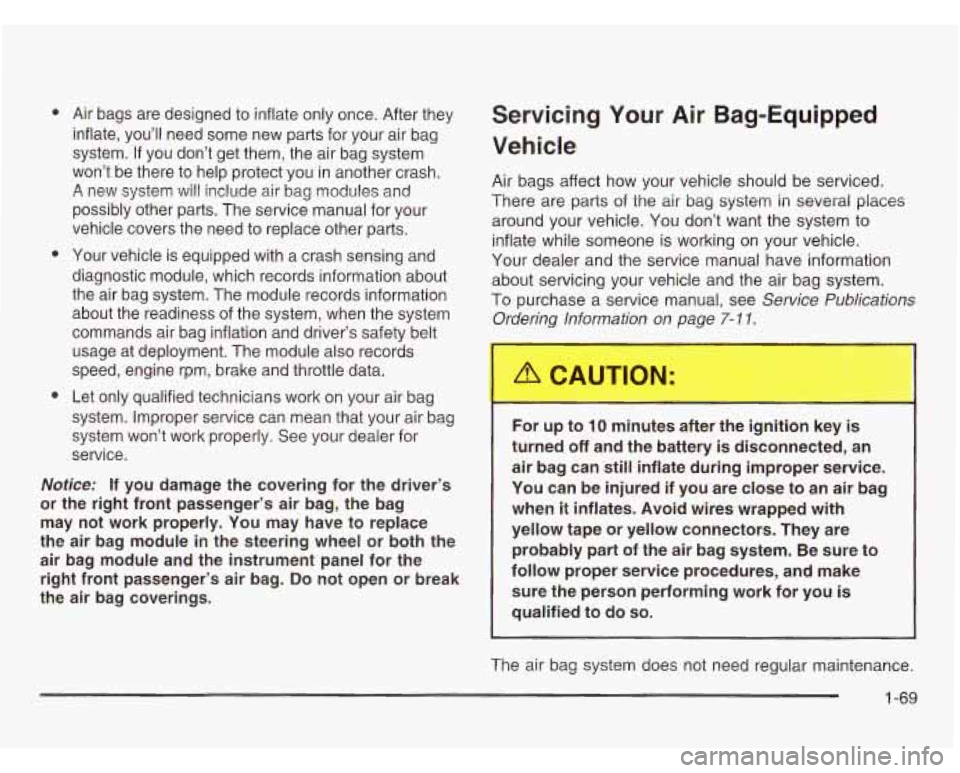
e
e
e
Air bags are designed to inflate only once. After they
inflate, you’ll need some new parts for your air bag
system.
If you don’t get them, the air bag system
won’t be there to help protect you in another crash.
A new system will include air bag modules and
possibly other parts. The service manual for your
vehicle covers the need to replace other parts.
Your vehicle is equipped with a crash sensing and
diagnostic module, which records information about
the air bag system. The module records information
about the readiness of the system, when the system
commands air bag inflation and driver’s safety belt
usage at deployment. The module also records
speed, engine rpm, brake and throttle data.
Let only qualified technicians work on your air bag
system. Improper service can mean that your air bag
system won’t work properly. See your dealer for
service.
Notice: If you damage the covering for the driver’s
or the right front passenger’s air bag, the bag
may not work properly. You may have to replace
the air bag module in the steering wheel or both the
air bag module and the instrument panel for the
right front passenger’s air bag.
Do not open or break
the air bag coverings.
Servicing Your Air Bag-Equipped
Vehicle
Air bags affect how your vehicle should be serviced.
There are parts of the air bag system in several places
around your vehicle. You don’t want the system
to
inflate while someone is working on your vehicle.
Your dealer and the service manual have information
about servicing your vehicle and the air bag system.
To purchase a service manual, see
Service Publications
Ordering Informqtion on page
7-1 1.
For up to 10 minutes after the ignition key is
turned off and the battery is disconnected, an
air bag can
still inflate during improper service.
You can be injured if you are close to an air bag
when
it inflates. Avoid wires wrapped with
yellow tape or yellow connectors. They are
probably part of the air bag system. Be sure to
follow proper service procedures, and make sure the person performing work for you
is
qualified to do so.
The air bag system does not need regular maintenance.
1-69
Page 80 of 386
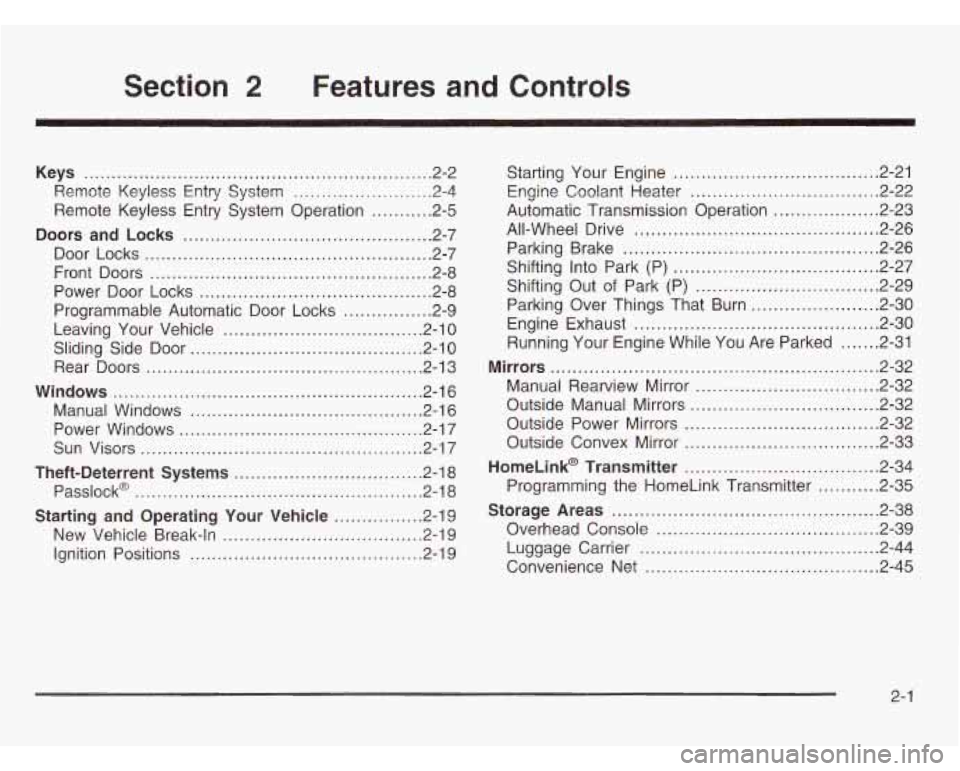
Section 2 Features and controls
Keys ............................................................... 2.2
Remote Keyless Entry System
~ = ~ . = = = = = -2-4
Remote Keyless Entry System Operation
.......... -2-5
Doors and Locks ............................................. 2-7
Door Locks
.................................................... 2.7
Front Doors
................................................... 2.8
Power Door Locks
.......................................... 2-8
Programmable Automatic Door Locks
................ 2.9
Leaving Your Vehicle
................................... -2-10
Sliding Side Door
......................................... -2-1 0
Rear Doors ................................................. -2-1 3
Windows ........................................................ 2.16
Manual Windows
.......................................... 2.16
Power Windows
........................................... -2-1 7
Sun Visors ................................................... 2.17
Theft-Deterrent Systems .................................. 2.18
Passlock@
.................................................... 2.18
Starting and Operating Your Vehicle ................ 2.19
New Vehicle Break-In
.................................... 2.19
Ignition Positions
........ ................... 2.19 Starting
Your Engine
..................................... 2.21
Engine Coolant Heater
.................................. 2.22
Automatic Transmission Operation
................... 2.23
All-Wheel Drive
............................................ 2.26
Parking Brake
.............................................. 2.26
Shifting Into Park (P)
..................................... 2-27
Shifting Out
of Park (P) ................................. 2-29
Parking Over Things That Burn
....................... 2-30
Running Your Engine While You Are Parked
....... 2-31
Engine Exhaust
............................................ 2-30
Mirrors ........................................................... 2.32
Manual Rearview Mirror
................................ -2-32
Outside Manual Mirrors
.................................. 2.32
Outside Power Mirrors
................................... 2.32
Outside Convex Mirror
................................... 2.33
HomeLink@ Transmitter ................................... 2.34
Programming the HomeLink Transmitter
........... 2.35
Storage Areas ................................................ 2.38
Overhead Console
........................................ 2.39
Luggage Carrier
........................................... 2.44
Convenience Net
.......................................... 2.45
2-1
Page 81 of 386
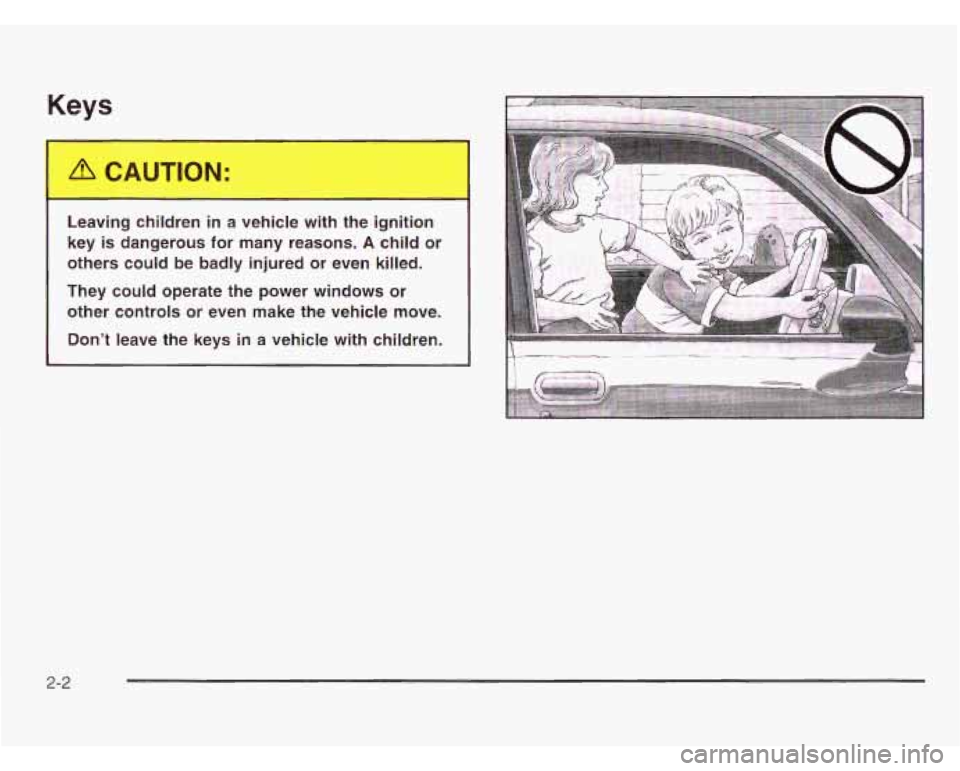
Keys
mm
!aving children in a vehicle with the ignition
key is dangerous for many reasons.
A child or
others could be badly injured or even killed.
They could operate the power windows or
other controls or even make the vehicle move.
Don’t leave the keys in a vehicle with children.
2-2
Page 82 of 386
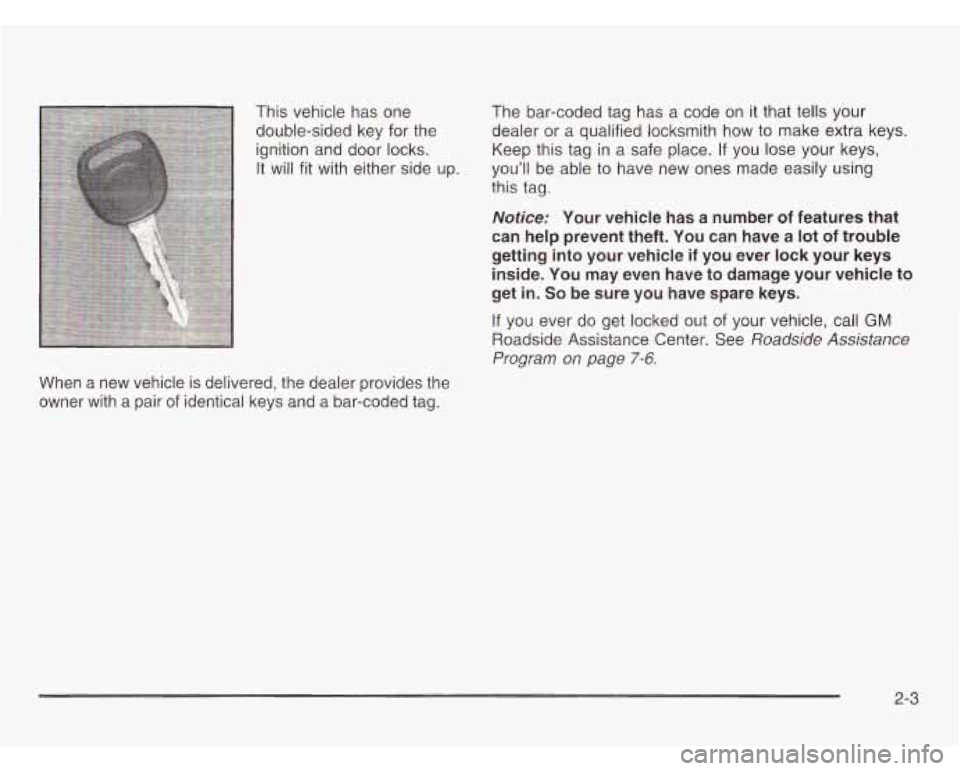
This vehicle has one The bar-coded tag has a code
on it that tells your
double-sided key for the dealer or a qualified locksmith how to make extra keys.
ignition and door locks.
Keep this tag in a safe place.
If you lose your keys,
It will fit with either side up. you’ll be able to have new ones made easily using
this tag.
Notice: Your vehicle has a number of features that
can help prevent theft. You can have a lot
of trouble
getting into your vehicle if you ever lock your keys
inside. You may even have to damage your vehicle to
get in. So be sure you have spare keys.
If you ever do get locked out of your vehicle, call GM
Roadside Assistance Center. See Roadside Assistance
Program on page 7-6.
When a new vehicle is delivered, the dealer provides the
owner with a pair of identical keys and a bar-coded tag.
2-3
Page 88 of 386
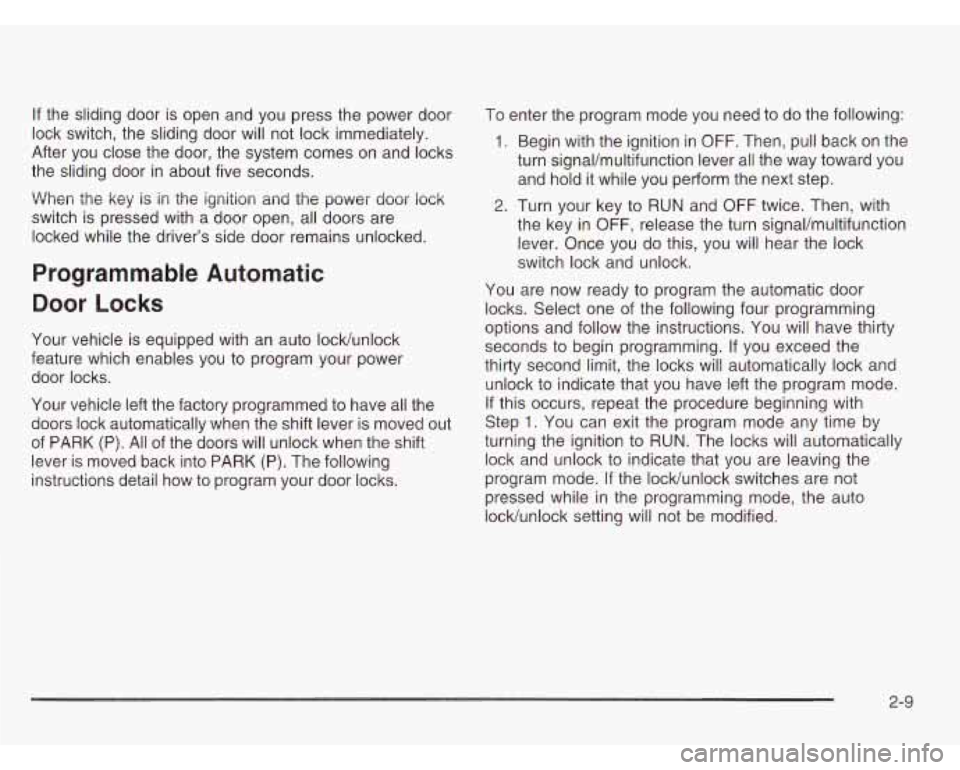
If the sliding door is open and you press the power door
lock switch, the sliding door will not lock immediately.
After you close the door, the system comes on and locks
the sliding door in about five seconds.
When the key is in the ignition and the
power door lock
switch is pressed with a door open, all doors are
locked while the driver’s side door remains unlocked.
Programmable Automatic
Door Locks
Your vehicle is equipped with an auto IocWunlock
feature which enables you
to program your power
door locks.
Your vehicle left the factory programmed to have all the
doors lock automatically when the shift lever is moved out
of PARK (P).
All of the doors will unlock when the shift
lever is moved back into PARK (P). The following
instructions detail how to program your door locks. To
enter the program mode you need to do the following:
1. Begin with the ignition in OFF. Then, pull back on the
turn signaVmultifunction lever all the way toward you
and hold
it while you perform the next step.
2. Turn your key to RUN and
OFF twice. Then, with
the key in
OFF, release the turn signaVmultifunction
lever. Once you do this, you will hear the lock
switch lock and unlock.
You are now ready to program the automatic door
locks. Select one
of the following four programming
options and follow the instructions. You
will have thirty
seconds to begin programming.
If you exceed the
thirty second limit, the locks will automatically lock and
unlock to indicate that you have left the program mode.
If this occurs, repeat the procedure beginning with
Step
1. You can exit the program mode any time by
turning the ignition to RUN. The locks will automatically
lock and unlock
to indicate that you are leaving the
program mode. If the IocWunlock switches are not
pressed while in the programming mode, the auto
IocWunlock setting will not be modified.
2-9
Page 96 of 386
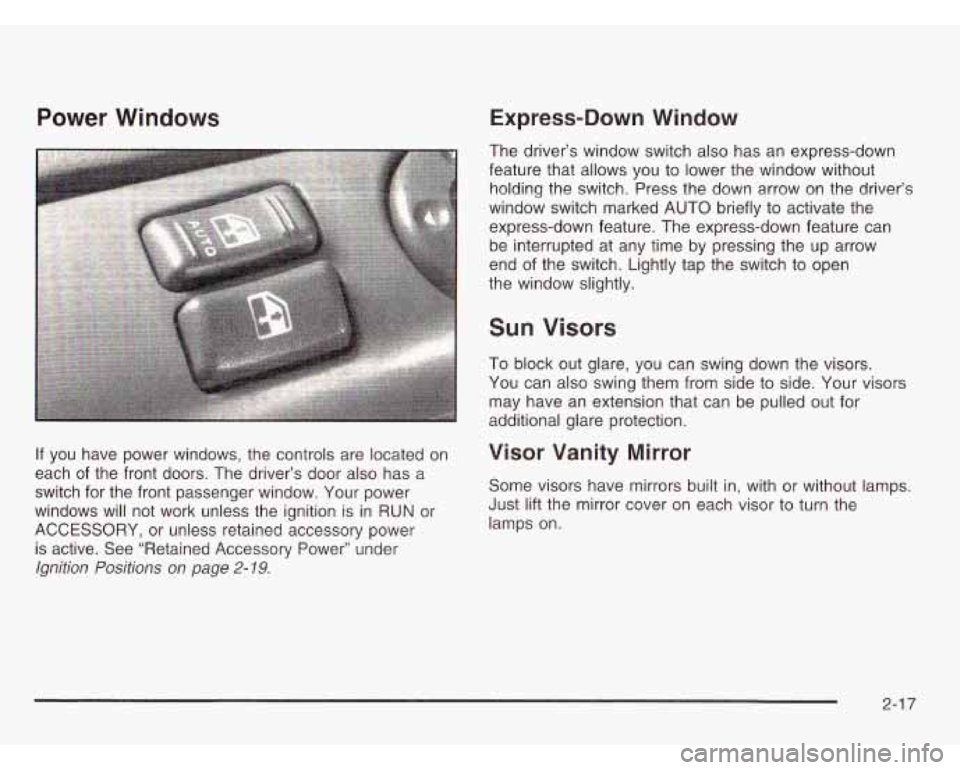
Power Windows
If you have power windows, the controls are located on
each of the front doors. The driver’s door also has a
switch for the front passenger window. Your power
windows will not work unless the ignition is in RUN or
ACCESSORY, or unless retained accessory power
is active. See “Retained Accessory Power” under
Ignition Positions on page 2-19.
Express-Down Window
The driver’s window switch also has an express-down
feature that allows you to lower the window without holding the switch. Press the down arrow on the driver’s
window switch marked AUTO briefly to activate the
express-down feature. The express-down feature can
be interrupted at any time by pressing the up arrow
end of the switch. Lightly tap the switch to open
the window slightly.
Sun Visors
To block out glare, you can swing down the visors.
You can also swing them from side to side. Your visors
may have an extension that can be pulled out for
additional glare protection.
Visor Vanity Mirror
Some visors have mirrors built in, with or without lamps.
Just lift the mirror cover on each visor to turn the
lamps on.
2-1 7
Page 97 of 386

Theft-Deterrent Systems
Vehicle theft is a big business, especially in some cities.
Although your vehicle has a number of theft-deterrent
features, we know that nothing we put on it can make
it impossible to steal. However, there are ways you
can help.
Passlock@
Your vehicle is equipped with the Passlock@
theft-deterrent system.
Passlock@ is a passive theft-deterrent system. Passlock@
enables fuel
if the ignition lock cylinder is turned with
a valid key.
If a correct key is not used or the ignition
lock cylinder is tampered with, fuel is disabled. During normal operation,
the SECURITY light will
go off
approximately five seconds after the key is turned
to RUN.
If the engine stalls and the SECURITY light flashes, wait
until the light stops flashing before trying to restart the
engine. Remember to release the key from START as
soon as the engine starts.
If the engine is running and the SECURITY light comes
on, you will be able to restart the engine
if you turn
the engine
off. However, your Passlock@ system is
not working properly and must be serviced by your
dealer. Your vehicle is not protected by Passlock@ at this
time. You may also want to check the fuse.
See
Fuses and Circuit Breakers on page 5-93.
See your dealer for service.
2-1 8
Page 98 of 386
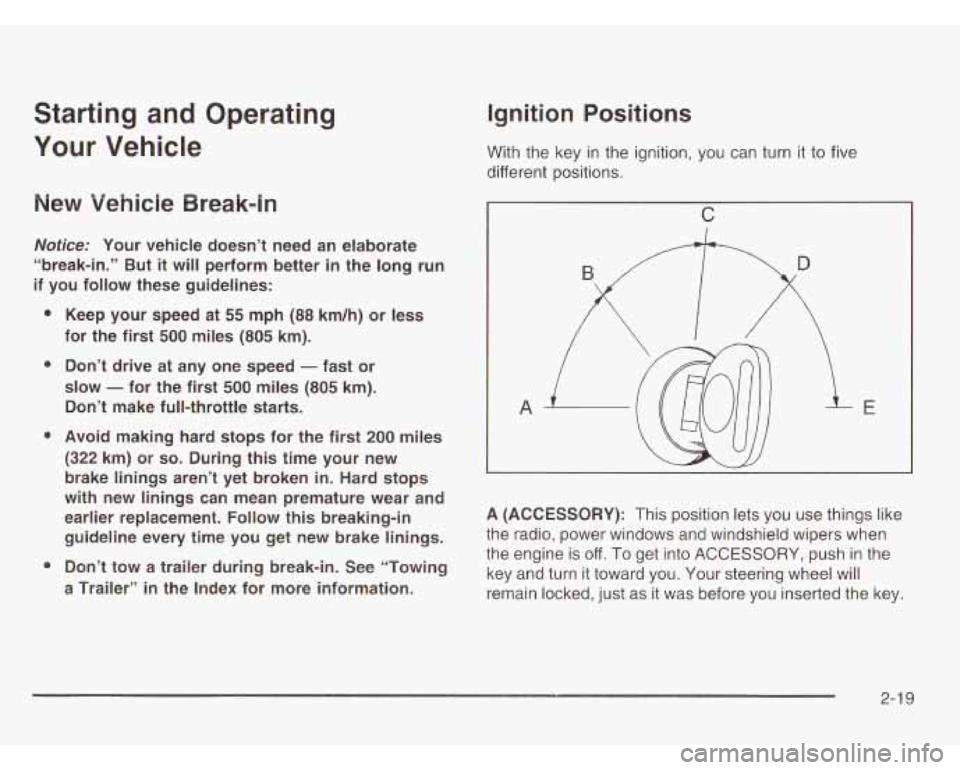
Starting and Operating
Your Vehicle
New Vehicle Break-in
Nofice: Your vehicle doesn’t need an elaborate
“break-in.” But
it will perform better in the long run
if you follow these guidelines:
e
e
Keep your speed at 55 mph (88 km/h) or less
for
the first 500 miles (805 km).
Don’t drive at any one speed
- fast or
slow
- for the first 500 miles (805 km).
Don’t make full-throttle starts.
Avoid making hard stops for the first
200 miles
(322 km) or so. During this time your new
brake linings aren’t yet broken in. Hard stops
with new linings can mean premature wear and
earlier replacement. Follow this breaking-in guideline every time you get new brake linings.
Don’t tow a trailer during break-in. See “Towing
a Trailer” in the Index for more information.
Ignition Positions
With the key in the ignition, you can turn it to five
different positions.
C
A
A (ACCESSORY): This position lets you use things like
the radio, power windows and windshield wipers when
the engine is off.
To get into ACCESSORY, push in the
key and turn it toward you. Your steering wheel will
remain locked, just as it was before you inserted the key.
2-1 9